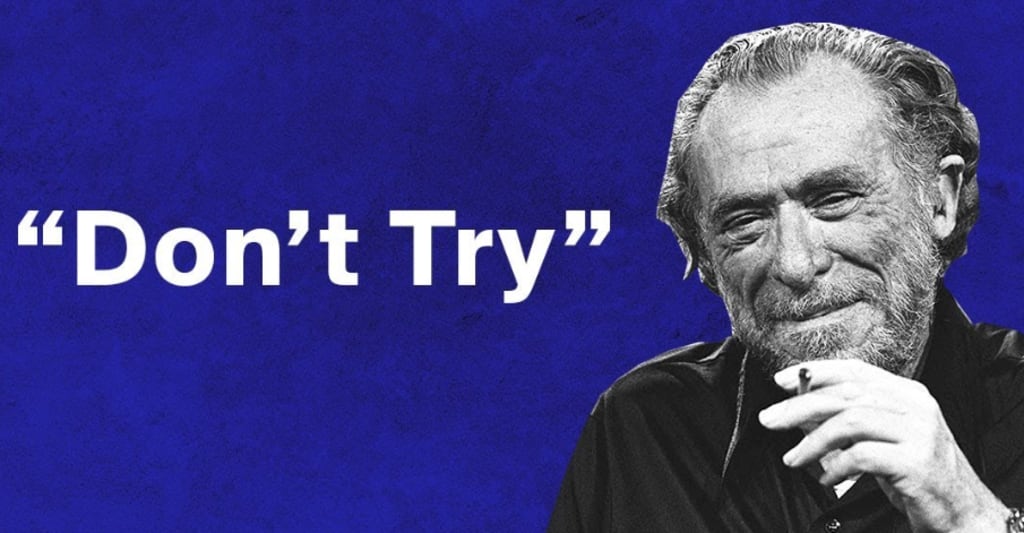Don't Try
Embracing the Bukowskian Philosophy of Life

Charles Bukowski, a prominent 20th century American essayist and writer, carried on with an existence damaged by misfortune and dismissal. Brought into the world in Germany in 1920, he emigrated to the US with his family in 1923. Bukowski's initial years were set apart by an excruciating youth, loaded up with actual maltreatment from his dad and disengagement because of his migrant status. His young years were additionally intensified by outrageous skin break out, which uplifted his hesitance and social confinement.
In a meeting sometime down the road, Bukowski thought about how his dad, through his steady maltreatment, unintentionally turned into his scholarly educator by showing him the significance of agony, particularly torment without reason. In spite of these difficulties, Bukowski's deep yearning to communicate his thoughts as an essayist continued.
After a short spell in school, Bukowski exited and left on his most memorable serious effort to turn into an expert essayist. For quite a long time, he worked different regular positions while composing many brief tales. Notwithstanding, his initial endeavors bore little organic product, with just a modest bunch of stories getting distributed, and, surprisingly, those made little progress.
Crippled by the distributing system and his apparent powerlessness to compose alright to succeed, Bukowski quit composing by and large for a period. He got back to working regular positions, especially at the mail center. It was during this time that he almost passed on from a serious draining ulcer in 1955.
Following this brush with death, Bukowski quit his place of employment at the mail center and continued composition. However he distributed a few pieces during this period, none made critical progress, and he needed to get back to his position at the mail center. Notwithstanding, this time, he kept on composing enthusiastically before his work shifts, gradually storing up an assortment of pieces distributed in dark magazines.
For quite a long time, Bukowski persisted, with practically zero acknowledgment or monetary profit. He continued to compose, every day of the week, regardless of the chances stacked against him. Achievement appeared to be subtle until, at last, in his 50s, Bukowski's tireless endeavors started to pay off. His work began acquiring consideration, and a distributer consented to subsidize his composition.
At the age when the vast majority resign, Bukowski at last made progress as an essayist. His work collected regard and acknowledgment in the abstract world and the more extensive social scene. Regardless of the long stretches of battle and self-question, he became one of the loved figures in writing.
Strangely, Bukowski's headstone conveys the basic yet cryptic expression: " Try not to Attempt." A message could appear to be dismal or disconnected to his account of steadiness and achievement. Yet, maybe in that lies the most significant example from Bukowski's life.
In a letter to a distributer companion, Bukowski stated, "When all that works best, it's not on the grounds that you picked composition, but since composing picked you." He recommended that genuine energy and intention are not picked; they pick us. Like a most loved variety that one naturally knows, our most profound longings and objects are inborn and irrefutable.
Bukowski accepted that we frequently buckle down and make a solid attempt, driven by outer thought processes like popularity, riches, or cultural assumptions. He contended that our actual reason uncovers itself when we are consumed by it, when it fills our contemplations, saturates our every pore, and turns into an indistinguishable piece of us.
Basically, Bukowski's "Don't Attempt" isn't a reprobation against exertion yet a challenge to be certifiable and fair with ourselves. It's a call to seek after the main thing, not on the grounds that we figure we ought to, but since we can't envision existence without it. At the point when the aggravation of not doing the very thing we love outperforms the enduring of the innovative approach, that is the point at which we ought to attempt — earnestly.
Charles Bukowski's biography is a demonstration of the getting through force of immovable assurance and realness. It advises us that achievement frequently arrives at the people who continue in their interest, directed by a characteristic enthusiasm that won't be hushed. In this way, maybe, eventually, Bukowski's message is definitely not a depressing one yet an update that genuine progress is brought into the world from making every moment count, in any event, when the world tells you not to attempt.
About the Creator
Chaudhary Haroon Ali
📚 Exploring the Power of Words. Join me on a linguistic journey through history, culture, and expression.
Enjoyed the story? Support the Creator.
Subscribe for free to receive all their stories in your feed. You could also pledge your support or give them a one-off tip, letting them know you appreciate their work.






Comments
There are no comments for this story
Be the first to respond and start the conversation.